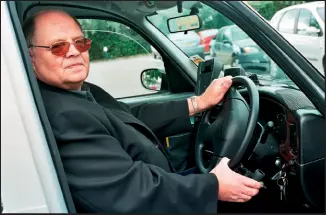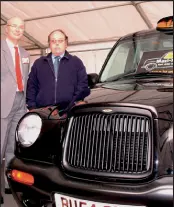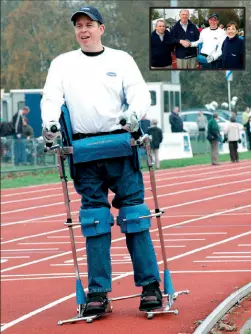|

|
Progress at last on badges
THE DEPARTMENT for Transport has at last set up a working group to consider the guidance that is required for badge holders, the police and enforcement authorities on the power to inspect Blue Badges.
The first meeting, planned for mid December, will involve the DDMC, the DDA, the Home Office, the Local Government Association and other interested parties.
“We've been calling for this for a long time” said DDMC Chief Executive, Ed Passant “and we want the process completed as quickly as possible. We need immediate action to restore the credibility of the Blue Badge scheme.”
A key recommendation of the Disabled Persons Transport Advisory Committee (DPTAC) review “Recommendations for Change” in April 2002 was the introduction of the right to inspect blue badges by enforcement officers in England and Wales (this right was already in existence in Scotland and Northern Ireland).
The Government eventually responded and by virtue of Section 94 of the Traffic Management Act 2004, police officers, traffic wardens, local authority parking attendants and civil enforcement officers have the power to inspect badges.
It is an offence to fail to produce a badge when requested to do so by any of these authorised persons – but these provisions will only come into force once guidance has been issued.
Once the working group has completed its task the guidance will then be subject to consultation at a later stage.
|
Merger plans forge ahead
THE SECOND joint meeting of trustees of the Disabled Drivers' Motor Club and the Disabled Drivers Association, held in early December, decided to set up a group to work on the practicalities of a merger of the two organisations.
The trustees had considered a consultation paper written by Ed Passant and Douglas Campbell, senior staff of the two organisations, which concluded that “the case for merger is compelling”.
Ed Passant, DDMC Chief Executive said: “We are delighted to be pushing ahead with the process and working through all the detail involved in merging two long-established charities.
“We are convinced that a merger could be of great benefit to our membership, and disabled motorists in general but, of course, once our work is complete it will be our membership who decides.”
The working group will report back on key issues by the end of March 2005.
|
Motability fixes prices and extends eligibility
MOTABILITY has launched a new pricing scheme to remove the uncertainty customers faced over advance payments and to increase the availability of lower start-cost vehicles.
The introduction of a fixed threemonthly price list for Motability vehicles will help customers choose their new cars knowing that advance payment prices won't fluctuate unexpectedly from one month to the next. In future, price lists will be published and fixed every three months.
Key changes to the pricing policy launched on October 1 include:
• No price list revisions until 1 January 2005
• A 12 per cent increase in the number of cars available at under £250 advance payment
• Five per cent more choice in cars available with advance payment under £500
Mike Betts, Chief Executive of Motability Operations, the company which runs the Motability car scheme, says: “We are delighted manufacturers have worked with us to deliver this improved customer service and have supported our commitment to ensure consistent pricing. Our negotiations also mean we are able to guarantee a range of makes and models at no advance payment, and retain a wide selection of highly affordable vehicles on the scheme.”
As well as the pricing changes, there has also been a change in the eligibility requirement for the Motability schemes.
Potential customers who have been awarded the higher rate mobility component of the Disability Allowance (DLA) for just 12 months or more will now also be eligible for the scheme. In the past, the award time span had to meet the three years minimum lease period of a Motability contract hire scheme.
Meanwhile, information about the Motability scheme is now available in a range of languages, in a move aimed at reaching many more potential customers.
The change coincides with a recent mailing campaign that targets a further 600,000 potential scheme users.
Don Brereton, Director of Motability, commented: “We are committed to ensuring that all publicity and information material about the Motability scheme is clear, easy to read and accessible to everyone.
“We have offered alternative formats such as audiotape and Braille for many years. This latest mailing carries that commitment further by being available in a wide range of formats. We hope this will help to inform many potential customers about the scheme, including those for whom English is not a first language.”
• For more information, call 0800 093 1000 or see www.motability.co.uk.
|
BSM appoints instructor team for disabled drivers
THE RAC driver training operation BSM has appointed an additional 15 instructors dedicated to helping disabled people get behind the wheel.
BSM's Mobility instructors specialise in training people born with a disability, those whose mobility problems are due to an accident or illness and people with learning difficulties. They also support older learners and retrain people who want to continue driving.
All fully qualified Approved Driving Instructors, the 15 have undergone further professional training at the Queen Elizabeth's Foundation Mobility Centre to gain an in-depth understanding of a wide range of mobility difficulties.
BSN says tuition is tailored to give each student the best chance of success and is provided in dual-controlled Vauxhall automatic cars fitted with a range of specialist adaptations.
These include an interchangeable accelerator pedal for right or left foot operation and a right hand push/pull lever that activates the brake and accelerator.
A six-way infrared unit and steering grip enable the driver to operate the horn, lights, windscreen wipers and indicators.
Additional equipment, such as booster cushions and panoramic mirrors, is provided depending on needs and in cases of severe physical disability, training is provided in the student's own specially adapted vehicle.
Full details about BSM Mobility training are available on 0845 727 6276 and from BSM's website: www.bsm.co.uk
|
Survey wants everyone to talk about sex
DISABILITY NOW newspaper has launched the UK's first in-depth survey on sex and disability, and is calling on disabled people across the country to get involved.
The move is backed by The Office star Julie Fernandez, who says that all disabled people should be able to lead fulfilling sex lives. But without evidence that society's barriers prevent disabled people from being sexually active – such as the lack of education and health services – the Government and other bodies will not put in adequate resources.
Julie says: “Sex has always played an important part in my life. I decided in my teens that I wouldn't miss out on this whole relationship/sex thing; I wouldn't let my disability get in the way. Having a disability shouldn't prevent anyone from having the amazing experience of sex.”
DN's comprehensive survey has been written by Simon Parritt, psychologist and senior lecturer at The Institute of Sexuality and Human Relations. The anonymous questionnaire asks for details on issues as diverse as the extent of sexual experience, preference for activities such as bondage, the use of prostitutes and sources of advice such as GPs.
It is published alongside an investigation into disabled people's use of sexual services, including sex workers and “surrogates” who say they aim to tackle both the physical and emotional aspects. The feature reveals that both young and older disabled people are concerned about sex. One man in his 30s has never had a sexual experience and many of those interviewed say sex is a health issue.
Some say more cash should be available for disabled people to access specialist health services and fully legalised sexual surrogacy services, which would allow them to “go out into society and find a relationship”.
To see the Let's Talk Sex survey, go to: www.disabilitynow.org.uk.
|
MPs support age equality campaign
SIX MONTHS into a campaign to end discrimination in disability benefits for people over the age of 65, a coalition of 24 leading charities has won the support of the majority of MPs. It also has the backing of active forums and groups and individuals from all over the country.
The Mobilise early day motion is one of the best supported in this parliamentary session with 241 MPs backing the call for equal treatment for those disabled after their 65th birthday.
At the moment you can claim Disability Living Allowance, a non means-tested benefit for people with care or mobility needs, up to the age of 65. Those who claim it before their 65th birthday can continue to receive it thereafter.
But if you become disabled or ill after the age of 65 you can only claim the less valuable benefit of Attendance Allowance.
Unlike DLA, this does not include any help with mobility needs – a lifeline to enable many older people to remain independent, active and socially engaged in their community.
Richard Wilson, Policy Officer at Help the Aged, spearheading the campaign, said, “Nowadays, as we live longer, people expect to be healthy and independent well beyond the age of 65. We want government to make available to all disabled people,
regardless of their age, the financial assistance they need to allow them to stay mobile.”
Further information is from: www.helptheaged.org.uk.
|
Naidex swallows Care Expo
CARE EXPO is to become part of Naidex following the acquisition by Emap Healthcare of the national exhibition for the intermediate and long-term care sectors.
Care Expo moved this year to Sandown Park in Surrey after three years at the Birmingham-based National Motorcycle Museum, and Emap Healthcare believes a return to the Midlands at the NEC will give it fresh momentum.
|
Briefly
BRITISH motorists visiting France could face on-the-spot fines of up to 138 euros for not wearing high visibility clothing in the event of a breakdown, as legislation introduced in Italy and Spain earlier this year looks ready to be adopted by France and Germany in 2005.
The legislation states that a reflective jacket or waistcoat must be worn if leaving an immobilised vehicle on the carriageway at night or in poor visibility.
Motorists could be breaking the law if they are not wearing a high visibility vest to set up warning triangles or to walk to an emergency phone.
THE Stroke Association has launched a new-look website packed with brand new features, services and interactive experiences.
Features now include an interactive discussion forum, information and common questions about stroke and special audio clips where visitors to the website can hear stroke survivors talking first hand about their experience. Log on to www.stroke.org.uk.
CYCLONE Mobility & Fitness launched their new “space age” Chameleon wheelchair at the Midland Centre for Spinal Injuries in Oswestry.
The chair, aimed at first-time users, is made from lightweight titanium and is fully adjustable, easy to manoeuvre and folds up to fit in a small vehicle.
More info from 0151 346 2310 or www.cyclonemobility.com
|
Fitness for everybody
THE INCLUSIVE Fitness Initiative (IFI) is to be extended to include private sector health and fitness clubs.
Ten pilot schemes will be identified in January 2005 and the Fitness Industry Association (FIA) is currently looking for operators to take part.
The IFI is a positive response to the Disability Discrimination Act, which provides support to fitness facilities in meeting access and service standards for their members. It aims to increase the currently limited opportunities available for disabled people, ensuring that they have access to facilities and providing accessible cardiovascular and resistance equipment.
Beyond this, the IFI also helps to ensure that staff, both inside and outside the fitness facility, are able to offer a safe, effective and value for money experience for all customers. The IFI also ensures these facilities communicate effectively with existing and prospective disabled customers making sure they feel welcome and encouraging them to join.
After lengthy dialogue between the Fitness Industry Association, Sport England and various other interest groups, the decision was taken to extend the current IFI scheme. The decision illustrates Sport England's commitment to engage with the private sector to create a more inclusive health and fitness industry and drive physical activity participation rates in England.
The funding will support the commitment from health club operators, who will in turn benefit from training, marketing support and ultimately gain from increased participants.
|
Carry on cabbie ...
A SPECIALLY adapted TXII purposebuilt taxi is helping to keep disabled Swindon cabbie Allan Wells (Right) in the driving seat – after more than a quarter of a century at the wheel.
Allan has taken delivery of the new automatic Silver specification TXII, to which LTI Vehicles' Birmingham main dealer, Mann & Overton, has fitted “He-man” hand controls to the steering wheel for braking and acceleration.
After a boyhood accident, Allan has had a number of operations on his legs which have left him unable to use a standard pedal-operated vehicle.
This is the fourth purpose-built taxi he has bought through Mann & Overton. It has also been fitted with a special seat to allow Allan more room to keep his legs in a comfortable position when driving.
Allan said: “Without the hand controls and different seat I would not be able to earn my living as a taxi driver.”
|

A SPECIALLY adapted TXII purposebuilt taxi is helping to keep disabled Swindon cabbie Allan Wells (above) in the driving seat – after more than a
quarter of a century at the wheel.
|
THE LTI Vehicles TXII purposebuilt taxi has been displayed at a major regional event to promote best practice in transport strategy among local authorities in the UK.
The staging of the “Around the Wrekin” event followed the Borough of Telford & Wrekin's
recognition with “Beacon” status by the Government for better local public transport in 2004- 2005.
The event, consisting of the vehicle exhibition, a conference and a series of workshops, attracted around 50 delegates from other local authorities and private sector organisations from across the UK. Key themes of the event included consultation, mobility management and marketing.
|

Nigel Armitage Smith (above) of the Borough of Telford & Wrekin with taxi driver Paul
Yuerin and the TXII.
|
Paul Moore, who has been paralysed from the chest down since a motorcycle accident 24 years ago, walks a mile using a special Dynamic Parapodium frame developed in Poland.
Forty-year-old Paul, who works for the Mobility Aids Centre in Peterborough, took on the charity challenge to back up his claims about the device.“Being able to stand and walk for the first time in 24 years was amazing,” he said. “It also helps internal organs, bones and other parts of the body, to be able not only to stand upright for at least part of the day, but to move around as well. I believe it will enhance the lives of hundreds of people; it also has a wonderful psychological effect on anyone who has been told they will never walk again.”
Paul also represents car manufacturer Ford and its MAGIC programme as ambassador and public speaker and was supported at the event by (inset, above) from left Andy Dougherty; Gwilym Bennett, Dealer Liaison Manager for MAGIC; and Rachel Moore,
Motability communications specialist for Ford.
|

Paul Moore, who has been paralysed from the chest down since
a motorcycle accident 24 years ago, walks a mile using a special
Dynamic Parapodium frame developed in Poland.
|
PATIENTS AT the Royal Hospital for Neuro-disability will be able to travel in a new ambulance thanks to the generosity of diners at a London restaurant.
Customers at the Outback Steakhouse, Wandsworth, donated £12,000 to buy the new
Fiat Freedom by adding an extra £1 to their restaurant bill, with all proceeds going to the hospital.
The ambulance will enable patients to take part in
trips and social events and maintain their independence and freedom.
|
 Above: (from left) The Royal hospital’s Head of Communications, Chloe Hayward; Tirzah, a Above: (from left) The Royal hospital’s Head of Communications, Chloe Hayward; Tirzah, a
patient from the hospital; and Nick Greengrass, proprietor of the Outback Steakhouse. |
|

|

